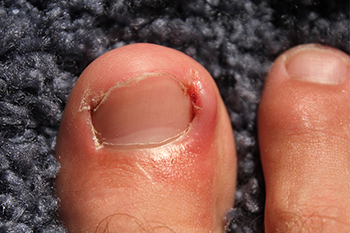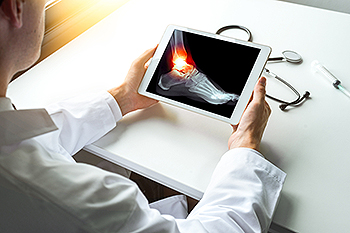Items filtered by date: February 2023
Are Ingrown Toenails Different From Toenail Fungus?

Newcomers to the world of podiatry might wonder whether ingrown toenails are, in fact, different from a toenail fungus. Despite their similarities and the fact that both conditions impact the toenails of the feet, they are two distinct conditions of the foot. An ingrown toenail is a condition that develops when the side of the toenail essentially grows into the skin surrounding the nail, producing redness and inflammation. Toenail fungus, however, is a fungal infection where the texture and quality of the nail itself are impaired. Individuals with toenail fungus might notice that their nail has become brittle in texture or yellow in color. If you want to learn more about the differences between these two distinct foot conditions or are seeking treatment, it is suggested that you contact a podiatrist today.
Ingrown toenails can become painful if they are not treated properly. For more information about ingrown toenails, contact one of our podiatrists of PA Foot & Ankle Associates. Our doctors can provide the care you need to keep you pain-free and on your feet.
Ingrown Toenails
Ingrown toenails occur when a toenail grows sideways into the bed of the nail, causing pain, swelling, and possibly infection.
Causes
- Bacterial infections
- Improper nail cutting such as cutting it too short or not straight across
- Trauma to the toe, such as stubbing, which causes the nail to grow back irregularly
- Ill-fitting shoes that bunch the toes too close together
- Genetic predisposition
Prevention
Because ingrown toenails are not something found outside of shoe-wearing cultures, going barefoot as often as possible will decrease the likeliness of developing ingrown toenails. Wearing proper fitting shoes and using proper cutting techniques will also help decrease your risk of developing ingrown toenails.
Treatment
Ingrown toenails are a very treatable foot condition. In minor cases, soaking the affected area in salt or antibacterial soaps will not only help with the ingrown nail itself, but also help prevent any infections from occurring. In more severe cases, surgery is an option. In either case, speaking to your podiatrist about this condition will help you get a better understanding of specific treatment options that are right for you.
If you have any questions please feel free to contact one of our offices located in Allentown, Easton, Northampton, and Chew Street in Allentown, PA . We offer the newest diagnostic and treatment technologies for all your foot and ankle needs.
Mild and Severe Fractures Can Require Different Treatments

A car accident, a sporting mishap, or a fall are the leading causes of broken ankles. They can range from severe to a hairline fracture, and they can require different forms of treatment. Most people who have broken their ankle often get an X-ray. This is generally successful in determining how severe the fracture is and deciding the type of treatment that will work. Wearing a boot or cast is a common form of treatment for mild breaks, and more severe breaks may require surgery for proper healing. Many broken ankles can bruise and swell, and frequently elevating the foot may reduce these symptoms. The toes may become stiff, and wiggling them may help them to feel better. Crutches may be used to walk and complete daily tasks while taking the weight off of the feet. If you have fallen and have ankle pain, please consult with a podiatrist who can properly diagnose and offer you the treatment option that is best for you.
Broken ankles need immediate treatment. If you are seeking treatment, contact one of our podiatrists from PA Foot & Ankle Associates. Our doctors can provide the care you need to keep you pain-free and on your feet.
Broken Ankles
A broken ankle is experienced when a person fractures their tibia or fibula in the lower leg and ankle area. Both of these bones are attached at the bottom of the leg and combine to form what we know to be our ankle.
When a physician is referring to a break of the ankle, he or she is usually referring to a break in the area where the tibia and fibula are joined to create our ankle joint. Ankles are more prone to fractures because the ankle is an area that suffers a lot of pressure and stress. There are some obvious signs when a person experiences a fractured ankle, and the following symptoms may be present.
Symptoms of a Fractured Ankle
- Excessive pain when the area is touched or when any pressure is placed on the ankle
- Swelling around the area
- Bruising of the area
- Area appears to be deformed
If you suspect an ankle fracture, it is recommended to seek treatment as soon as possible. The sooner you have your podiatrist diagnose the fracture, the quicker you’ll be on the way towards recovery.
If you have any questions, please feel free to contact one of our offices located in Allentown, Easton, Northampton, and Chew Street in Allentown, PA . We offer the newest diagnostic and treatment technologies for all your foot care needs.
Do Your Child's Feet Hurt?
Serious Causes of Foot Pain

Many different things can affect the health of the feet. For example, there can be a problem with the thyroid that interferes with the making of crucial hormones which impacts the nerves associated with sensation in the feet. Degenerative conditions in the lower back leading to irritation of the spinal cord can also affect the health of the feet. Three more serious causes of foot pain are Peripheral Arterial Disease or PAD, rheumatoid arthritis, and gout. PAD occurs when plaque builds up in the arteries of the legs and reduces blood flow to the lower legs and feet. This can lead to a host of problems, including foot pain and wounds that heal poorly. Rheumatoid arthritis develops when the immune system mistakenly attacks joints and can cause swelling and pain in the feet, as well as possibly change the shape of your toes and feet. Gout is another type of arthritis arising from the accumulation of uric acid in the body collecting in joints, particularly the big toe joint. Because foot pain can come on with no obvious cause, if you are having such pain, please see a podiatrist for a proper diagnosis and treatment plan.
Foot Pain
Foot pain can be extremely painful and debilitating. If you have a foot pain, consult with one of our podiatrists from PA Foot & Ankle Associates. Our doctors will assess your condition and provide you with quality foot and ankle treatment.
Causes
Foot pain is a very broad condition that could be caused by one or more ailments. The most common include:
- Bunions
- Hammertoes
- Plantar Fasciitis
- Bone Spurs
- Corns
- Tarsal Tunnel Syndrome
- Ingrown Toenails
- Arthritis (such as Gout, Rheumatoid, and Osteoarthritis)
- Flat Feet
- Injury (from stress fractures, broken toe, foot, ankle, Achilles tendon ruptures, and sprains)
- And more
Diagnosis
To figure out the cause of foot pain, podiatrists utilize several different methods. This can range from simple visual inspections and sensation tests to X-rays and MRI scans. Prior medical history, family medical history, and any recent physical traumatic events will all be taken into consideration for a proper diagnosis.
Treatment
Treatment depends upon the cause of the foot pain. Whether it is resting, staying off the foot, or having surgery; podiatrists have a number of treatment options available for foot pain.
If you have any questions, please feel free to contact one of our offices located in Allentown, Easton, Northampton, and Chew Street in Allentown, PA . We offer the newest diagnostic and treatment technologies for all your foot care needs.
Eating the Right Foods Can Help Reduce Foot Pain

Including certain foods in your diet is a good way to keep your feet healthy, experts say. This is especially true with people who suffer from gout, diabetes, and heart disease. Each of these conditions have a direct relationship with the health of the feet. For instance, ginger acts as an anti-inflammatory, hot peppers stimulate nerve endings, and salmon, which is high in omega-3 acids, improves blood flow. Additionally, chocolate and walnuts can improve moisture balance, which helps prevent calluses. Cherries, which are high in antioxidants, can help relieve muscle soreness, and asparagus contains compounds that help to reduce swelling. Other foods shown to reduce swelling and water retention are pumpkin, yogurt, and parsley. The foot contains 26 bones. Foods that contain certain vitamins and minerals that are believed to improve bone health include cheese, spinach, sardines, and tuna. In addition to eating foods that promote foot health, it is also important to make periodic visits to a podiatrist who can treat any serious or painful conditions that may arise.
Everyday foot care is very important to prevent infection and other foot ailments. If you need your feet checked, contact one of our podiatrists from PA Foot & Ankle Associates. Our doctors can provide the care you need to keep you pain-free and on your feet.
Everyday Foot Care
Often, people take care of their bodies, face and hair more so than they do for their feet. But the feet are a very important aspect of our bodies, and one that we should pay more attention to. Without our feet, we would not be able to perform most daily tasks.
It is best to check your feet regularly to make sure there are no new bruises or cuts that you may not have noticed before. For dry feet, moisturizer can easily be a remedy and can be applied as often as necessary to the affected areas. Wearing shoes that fit well can also help you maintain good foot health, as well as making it easier to walk and do daily activities without the stress or pain of ill-fitting shoes, high heels, or even flip flops. Wearing clean socks with closed shoes is important to ensure that sweat and bacteria do not accumulate within the shoe. Clean socks help to prevent Athlete’s foot, fungi problems, bad odors, and can absorb sweat.
If you have any questions please feel free to contact one of our offices located in Allentown, Easton, Northampton, and Chew Street in Allentown, PA . We offer the newest diagnostic and treatment technologies for all your foot and ankle needs.

